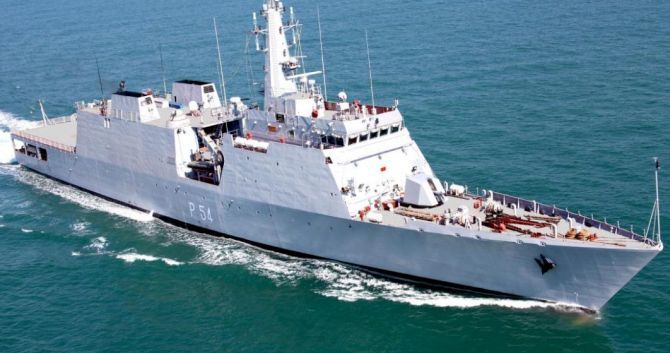 | « Back to article | Print this article |
These next generation ships can patrol the oceans for three or four months compared to the navy's current patrol boats, which can be at sea for a maximum of 45 days.
Ajai Shukla reports.

The defence ministry has cleared the acquisition of the first of its planned 'next-generation' warships -- six Next-Generation Offshore Patrol Vessels (NGOPVs) for an estimated cost of Rs 4,941 crore (Rs 49.41 billion), or about Rs 825 crore (Rs 8.25 billion) each.
These will be followed by 'next-generation missile boats', 'next-generation frigates' and 'next-generation destroyers'. All these vessels are currently being designed by the navy's internal design directorate.
'The NGOPVs will be built in indigenous shipyards and will be fitted with state-of-the-art sensor suite with increased endurance,' a defence ministry release stated.
Tenders are likely to go out soon to public sector and private sector Indian shipyards.
Each NGOPV will displace an estimated 2,500 tonne, making this class of vessel significantly larger and more potent than the current OPVs in the navy and Coast Guard.
OPVs are large craft that carry a crew of up to 80 to 90 sailors, but are much more lightly armed -- and therefore much cheaper -- than capital warships like corvettes, frigates or destroyers.
For performing tasks that do not require heavy fighting, OPVs offer a far more economical option than using heavily armed capital warships.
In contrast to the Rs 825 crore (Rs 8.25 billion) cost of each NGOPV, each new frigate that will be built under the forthcoming Project 17A will cost Rs 6,400 crore (Rs 64 billion).
Seven Project 17A frigates are slated to be built at Mazagaon Dock, Mumbai and Garden Reach Shipbuilders and Engineers, Kolkata.
An NGOPV contract would be a lifeline for private sector shipbuilders like L&T, which has successfully displayed its ability to build OPVs for the Coast Guard at its Kattupalli facility, with the first two vessels delivered ahead of schedule.
eanwhile, the Pipavav shipyard of Reliance Naval and Engineering has laboured unsuccessfully on an eight-year-old order for five naval OPVs.
With delivery schedules long overdue, the first two OPVs are still barely complete.
Under similar circumstances earlier, the navy had slapped cancellation orders on the ABG, Bharti, and Alcock & Ashdown shipyards.
The navy believes private shipyards are not yet capable of building complex capital warships that incorporate and integrate complex 'weapons-and-sensor-suites'.
'These platforms will strengthen maritime security by undertaking a multitude of operational roles both in blue-water and littorals, the defence ministry said.
'These include seaward defence, protection of offshore assets, maritime interdiction operations and search and seizure operations, surveillance missions, mine warfare, anti-piracy missions, counter infiltration operations, anti-poaching/trafficking operations, humanitarian assistance and disaster relief, and search-and-rescue missions,' the defence ministry pointed out.
"The NGOPV will have an endurance of three-four months, compared to just 30-45 days that current OPVs can patrol for," a senior navy officer said.
"It will have better seakeeping ability (ability to withstand bad weather) and have greatly improved facilities for crew living, given the longer patrols it will be deployed on."